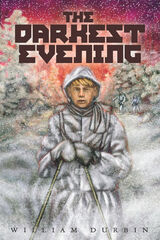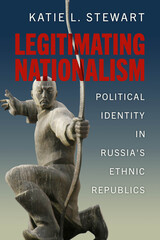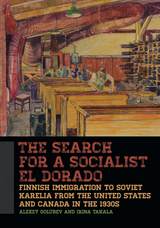3 books about Karelia

The Darkest Evening
William Durbin
University of Minnesota Press, 2011
In the 1930s, some 6,000 Finnish Americans traveled to Karelia, a province in Northwestern Russia, hoping to leave the Depression behind and to establish a workers’ paradise. Based on these true events, The Darkest Evening chronicles the story of Jake Maki, whose father, caught up in the socialist fervor washing over their Finnish mining community in Minnesota, moves their family to the Soviet Union.
Instead of finding the utopia they were promised, Jake and his family encounter only disappointment and hardship. When Stalin’s secret police begin targeting Americans for arrest, his worst fears are confirmed, and Jake leads his family on a daring midwinter escape attempt on cross-country skis, fleeing toward the Finnish border.
[more]

Legitimating Nationalism
Political Identity in Russia's Ethnic Republics
Katie L. Stewart
University of Wisconsin Press, 2024
Russia is a large, diverse, and complicated country whose far-flung regions maintain their own histories and cultures, even as President Vladimir Putin increases his political control. Powerful, autocratic regimes still need to establish their legitimacy; in Russia, as elsewhere, developing a compelling national narrative and building a sense of pride and belonging in a national identity is key to maintaining a united nation. It can also legitimate political power when leaders present themselves as the nation’s champions. Putin’s hold thus requires effective nation building— propagating the ever-evolving and often contested story of who, exactly, is Russian and what, exactly, that means.
Even in the current autocratic system, however, Russia’s multiethnic nature and fractured political history mean that not all political symbols work the same way everywhere; not every story finds the same audience in the same way. The message may emanate from Moscow, but regional actors—including local governments, civic organizations, and cultural institutions—have some agency in how they spread the message: some regionalization of identity work is permitted to ensure that Russian national symbols and narratives resonate with people, and to avoid protest. This book investigates how nation building works on the ground through close studies of three of Russia’s ethnic republics: Karelia, Tatarstan, and Buryatia. Understanding how the project of legitimating nationalism, in support of a unified country and specifically Putin’s regime, works in practice offers crucial context in understanding the shape and story of contemporary Russia.
Even in the current autocratic system, however, Russia’s multiethnic nature and fractured political history mean that not all political symbols work the same way everywhere; not every story finds the same audience in the same way. The message may emanate from Moscow, but regional actors—including local governments, civic organizations, and cultural institutions—have some agency in how they spread the message: some regionalization of identity work is permitted to ensure that Russian national symbols and narratives resonate with people, and to avoid protest. This book investigates how nation building works on the ground through close studies of three of Russia’s ethnic republics: Karelia, Tatarstan, and Buryatia. Understanding how the project of legitimating nationalism, in support of a unified country and specifically Putin’s regime, works in practice offers crucial context in understanding the shape and story of contemporary Russia.
[more]

The Search for a Socialist El Dorado
Finnish Immigration to Soviet Karelia from the United States and Canada in the 1930s
Alexey Golubev and Irina Takala
Michigan State University Press, 2014
In the 1930s, thousands of Finns emigrated from their communities in the United States and Canada to Soviet Karelia, a region in the Soviet Union where Finnish Communist émigrés were building a society to implement their ideals of socialist Finland. To their new socialist home, these immigrants brought critically needed skills, tools, machines, and money. Educated and skilled, American and Canadian Finns were regarded by Soviet authorities as agents of revolutionary transformations who would not only modernize the economy of Soviet Karelia, but also enlighten its society. North American immigrants, indeed, became active participants of socialist colonization of what Bolshevik leaders perceived as dark, uneducated and backward Soviet ethnic periphery. The Search for a Socialist El Dorado is the first comprehensive account in English of this fascinating story. Using a vast body of documentary sources from archives in Petrozavodsk and Moscow, Russian- and Finnish-language press and literature from the 1930s, oral history interviews and secondary literature, Alexey Golubev and Irina Takala explore in depth the “Karelian fever” among Finnish Americans and Canadians, and the lives of immigrants in the Soviet Union, their contribution to Soviet economy and culture, and their fates in the Great Terror.
[more]
READERS
Browse our collection.
PUBLISHERS
See BiblioVault's publisher services.
STUDENT SERVICES
Files for college accessibility offices.
UChicago Accessibility Resources
home | accessibility | search | about | contact us
BiblioVault ® 2001 - 2024
The University of Chicago Press









